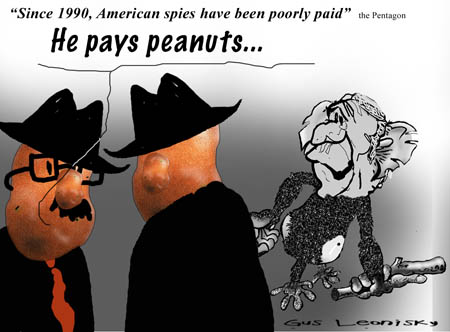Search
Recent comments
- condolences....
3 hours 25 min ago - in cold blood....
4 hours 48 min ago - LIES....
4 hours 55 min ago - journalism....
15 hours 42 sec ago - day three.....
15 hours 44 min ago - lawful law?....
16 hours 4 min ago - insurance....
16 hours 11 min ago - terrorists....
16 hours 22 min ago - nukes?...
18 hours 29 min ago - rape....
19 hours 8 min ago
Democracy Links
Member's Off-site Blogs
on dead-drops & microdots .....

For anyone at the CIA or the Pentagon who might be considering moonlighting as a spy, the report offers a warning: 'Since 1990, American spies have been poorly paid.'
In fact, the proportion of those who received no payment at all for espionage increased from 34 percent before 1980 to 59 percent during the 1980s and to 81 percent since 1990.
And that's not all. At the same time that the ability to make money from spying has decreased, the chances of doing time in prison have increased - dramatically.
During the 1970s, when the U.S. Justice Department attempted to turn U.S. spies working for the Soviets into double agents rather than jail them, 22 percent served no time in prison. The idea seldom worked, so by the 1990s, 94 percent of those convicted ended up in the slammer.
On the bright side - for the spies - there has been a trend toward judges imposing shorter sentences.- By Gus Leonisky at 2 May 2008 - 9:44pm
- Gus Leonisky's blog
- Login or register to post comments
blowing whistles...?
By DAVID STOUT
Published: May 7, 2008
WASHINGTON — The office of the official responsible for protecting federal workers from political interference was raided by F.B.I. agents on Tuesday as part of an investigation into whether he himself mixed politics with official business.
The raid took place at the office of Scott J. Bloch, the head of the Office of Special Counsel. Computers and documents were seized by agents trying to determine whether Mr. Bloch obstructed justice by hiring an outside company to “scrub” his computer files, The Associated Press reported. Investigators also searched Mr. Bloch’s home in suburban Virginia after obtaining a subpoena.
“It is not clear to us what they are searching for,” James Mitchell, a spokesman for the office, told Reuters. “We are cooperating with law enforcement.” Mr. Mitchell said about 20 agents from the Federal Bureau of Investigation took part in the raid.
The Office of Special Counsel gives advice to federal employees on which activities are proper and which are not allowed under the Hatch Act, which is supposed to guard against direct political interference in governmental affairs. Mr. Bloch’s duties including shielding whistle-blowers who disclose such political meddling.
dosh on the side...
CIA moonlights in corporate world
By: Eamon Javers
In the midst of two wars and the fight against Al Qaeda, the CIA is offering operatives a chance to peddle their expertise to private companies on the side — a policy that gives financial firms and hedge funds access to the nation’s top-level intelligence talent, POLITICO has learned.
In one case, these active-duty officers moonlighted at a hedge-fund consulting firm that wanted to tap their expertise in “deception detection,” the highly specialized art of telling when executives may be lying based on clues in a conversation.
The never-before-revealed policy comes to light as the CIA and other intelligence agencies are once again under fire for failing to “connect the dots,” this time in the Christmas Day bombing plot on Northwest Flight 253.
But sources familiar with the CIA’s moonlighting policy defend it as a vital tool to prevent brain-drain at Langley, which has seen an exodus of highly trained, badly needed intelligence officers to the private sector, where they can easily double or even triple their government salaries. The policy gives agents a chance to earn more while still staying on the government payroll.
A government official familiar with the policy insists it doesn’t impede the CIA’s work on critical national security investigations. This official said CIA officers who want to participate in it must first submit a detailed explanation of the type of work involved and get permission from higher-ups within the agency.
“If any officer requests permission for outside employment, those requests are reviewed not just for legality, but for propriety,” CIA spokesman George Little told POLITICO.
There is much about the policy that is unclear, including how many officers have availed themselves of it, how long it has been in place and what types of outside employment have been allowed. The CIA declined to provide additional details.
Generally, federal employees across the vast government work force are allowed to moonlight in the private sector, but under tight guidelines, that can vary from agency to agency, according to the federal Office of Government Ethics.
“In general, for most nonpolitical employees, they may engage in outside employment, but there are some restrictions,” said Elaine Newton, an attorney at the Office of Government Ethics. She explained that agencies throughout the federal government set their own policies on outside employment, and that they all typically require that the employment not represent a conflict of interest with the employee’s federal job and that the employee have written approval before taking on the work.
----------------------
This article was adapted by the author from his book, "broker, trader, lawyer, spy"... read the book, read more of this article and see toon at top.